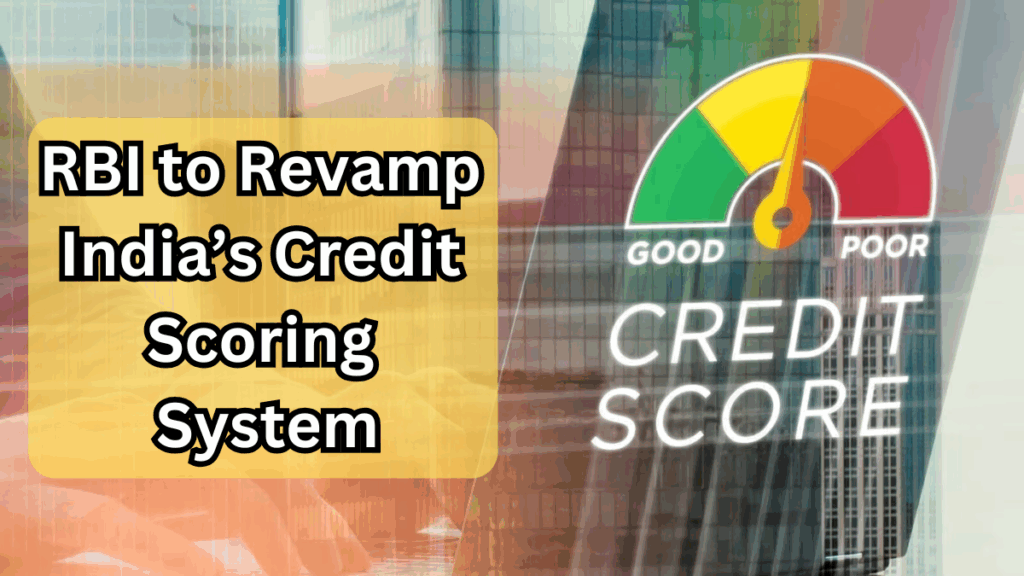India’s lending landscape is undergoing a transformation. The Reserve Bank of India (RBI) is preparing to launch a revamped credit scoring system in 2025, aimed at making the process more inclusive, transparent, and reflective of modern financial behavior.
This shift in the RBI credit scoring model is more than just a backend update—it’s designed to empower borrowers with fairer evaluations, especially for those previously underserved by the current system. Here’s what you should know about the upcoming CIBIL change 2025 and how it could impact you.

Table of Contents
Why Is RBI Revamping the Credit Scoring System?
The current credit score models, used by bureaus like CIBIL, Experian, and Equifax, rely mostly on past credit activity—like loan repayment behavior and credit card usage. However, this creates a disadvantage for people with little or no credit history.
The RBI aims to fix that by introducing a broader, more inclusive model.
Key reasons for the overhaul:
-
To include alternate data like utility bills, rent payments, and telecom history
-
To give new-to-credit individuals a fairer assessment
-
To improve lending accuracy and reduce loan defaults
-
To align with global credit evaluation standards
What Will Change with the New Credit Score Rule in India?
The proposed new credit score rule India will make use of non-traditional financial data and improve accessibility for a wider range of borrowers.
Here’s a comparison of the current system vs the upcoming changes:
Feature |
Current Credit Model |
RBI’s 2025 Model (Proposed) |
|---|---|---|
Basis of Evaluation |
Loan repayments, credit usage |
Utility bills, rent, telecom data + more |
Accessibility for New Borrowers |
Low |
High |
Data Sources |
Banks and financial institutions |
Includes alternate sources (non-bank) |
Objective |
Risk prediction for lenders |
Broader financial inclusion |
How Will This Affect Borrowers?
For many Indians—especially gig workers, freelancers, students, or homemakers—credit access has always been tough due to the lack of formal income or credit history. This change promises to make a significant difference.
Here’s what it means for you:
-
New borrowers can now build creditworthiness through digital payments or utility bills
-
Existing borrowers might see their scores change based on additional data
-
Loan approvals could become more streamlined and inclusive
-
More transparency in how scores are calculated
If you’ve had trouble qualifying for loans or credit cards in the past, this update under the RBI credit scoring model could be a game-changer.
What Should Borrowers Do to Prepare?
Here are some practical steps to make the most of the CIBIL change 2025:
-
Start paying your utility bills (electricity, water, mobile) on time
-
Maintain digital payment discipline (UPI, rent apps, etc.)
-
Review your credit reports regularly from multiple bureaus
-
Avoid late payments—even for non-bank services
Being financially responsible across all platforms—not just traditional loans—will soon contribute to your creditworthiness.
FAQs
1. What is the new credit score rule in India all about?
The new rule aims to redefine credit evaluation by including alternative data such as utility bills, rent payments, and digital transactions, making credit more accessible and inclusive.
2. When will the CIBIL change 2025 be implemented?
The RBI has proposed a full rollout in 2025. While an exact date hasn’t been finalized, updates and pilot models may begin appearing sooner.
3. Will my existing credit score change?
Yes, it could. With additional data being considered, your credit score might increase or decrease depending on your overall financial behavior beyond loans and credit cards.
4. Can I check how the new model affects my score?
Once implemented, credit bureaus will begin showing how alternative data impacts your score. Until then, staying consistent with responsible financial behavior is key.
Click here to learn more
